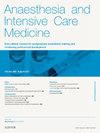心肺复苏和复苏后护理
IF 0.3
Q4 ANESTHESIOLOGY
引用次数: 0
摘要
心脏骤停患者能否存活并在随后获得良好的神经功能预后,取决于及时诊断、高质量的心肺复苏(CPR)(尽量减少中断)和快速除颤(如有必要)。在复苏后阶段,诊断和治疗导致心跳骤停的根本原因,避免低血压、高热、高氧、高/低血糖,并控制癫痫发作活动,这样才最有可能获得成功。幸存者的早期预后很难预测,应由专家使用各种行之有效的方法进行预测。本文章由计算机程序翻译,如有差异,请以英文原文为准。
Cardiopulmonary resuscitation and post-resuscitation care
Survival and subsequent good neurological outcome following cardiac arrest depends on prompt diagnosis, good-quality cardiopulmonary resuscitation (CPR) with minimal interruptions and rapid defibrillation, if appropriate. In the post-resuscitation phase, diagnosis and treatment of the underlying cause for the arrest with avoidance of hypotension, hyperthermia, hyperoxia, hyper/hypoglycaemia and management of seizure activity confers the best chances of a successful outcome. Early prognostication of survivors is difficult and should be done by experts using a variety of proven modalities.
求助全文
通过发布文献求助,成功后即可免费获取论文全文。
去求助
来源期刊

Anaesthesia and Intensive Care Medicine
ANESTHESIOLOGY-
CiteScore
0.50
自引率
0.00%
发文量
152
期刊介绍:
Anaesthesia and Intensive Care Medicine, an invaluable source of up-to-date information, with the curriculum of both the Primary and Final FRCA examinations covered over a three-year cycle. Published monthly this ever-updating text book will be an invaluable source for both trainee and experienced anaesthetists. The enthusiastic editorial board, under the guidance of two eminent and experienced series editors, ensures Anaesthesia and Intensive Care Medicine covers all the key topics in a comprehensive and authoritative manner. Articles now include learning objectives and eash issue features MCQs, facilitating self-directed learning and enabling readers at all levels to test their knowledge. Each issue is divided between basic scientific and clinical sections. The basic science articles include anatomy, physiology, pharmacology, physics and clinical measurement, while the clinical sections cover anaesthetic agents and techniques, assessment and perioperative management. Further sections cover audit, trials, statistics, ethical and legal medicine, and the management of acute and chronic pain.
 求助内容:
求助内容: 应助结果提醒方式:
应助结果提醒方式:


